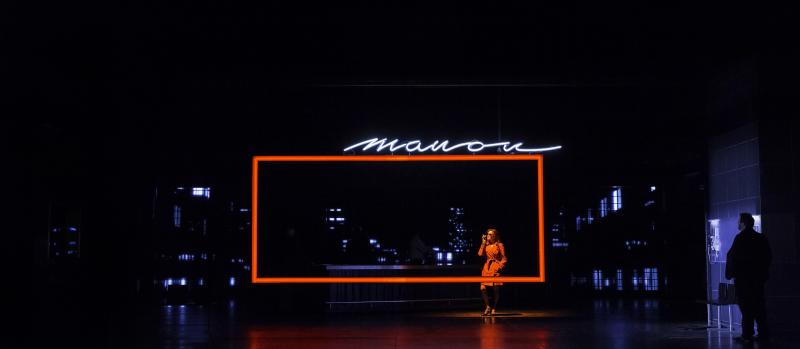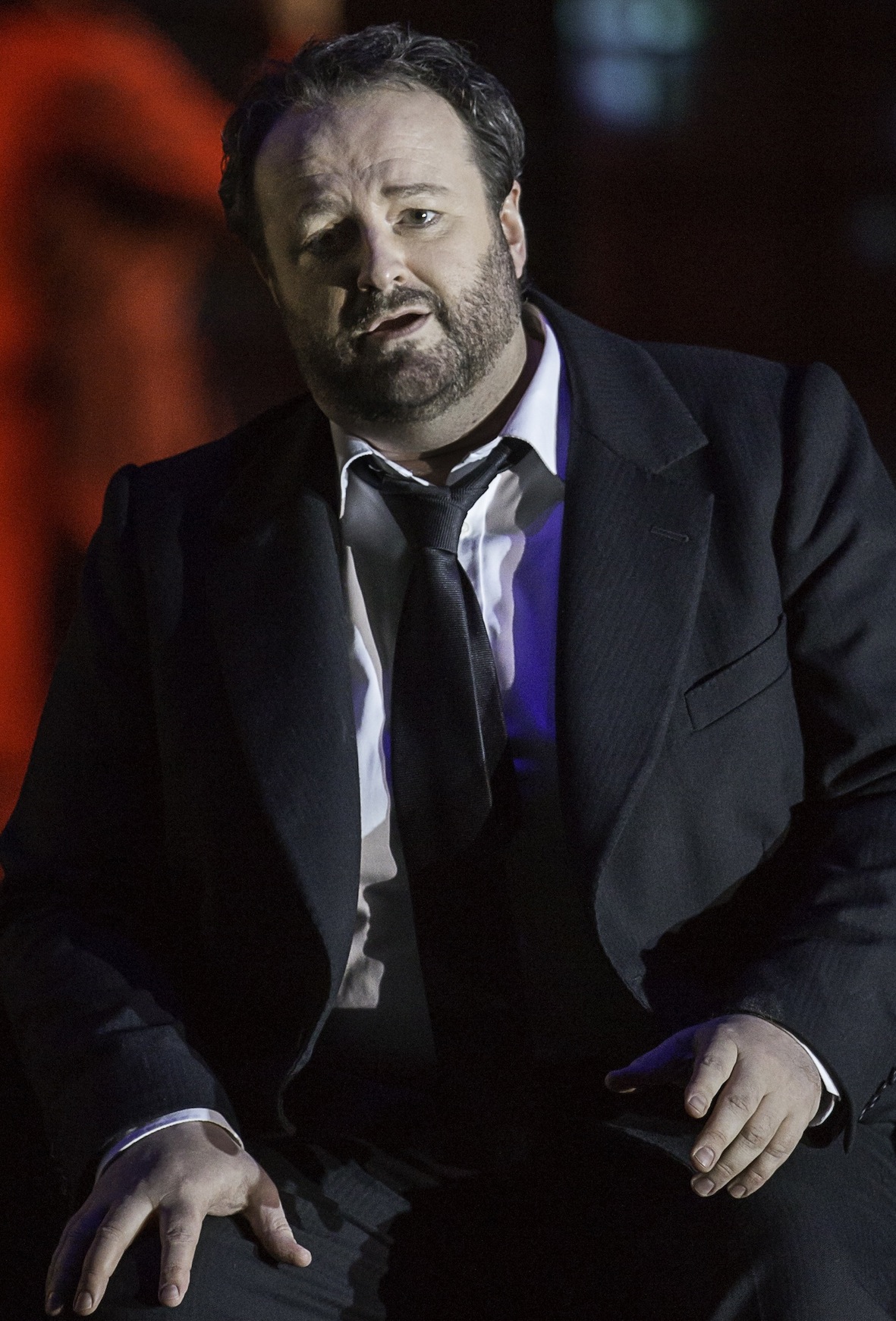Manon Lescaut, Welsh National Opera | reviews, news & interviews
Manon Lescaut, Welsh National Opera
Manon Lescaut, Welsh National Opera
Puccini charmer rehoused in an airport lounge, saved by the conductor

As before, WNO have a theme for their new opera season: this time it’s Fallen Women, a topic that might well attract the attention of the Equal Opportunities Commission. Surely men have the right to fall as well; we await, in June, The Fall of the House of Usher, a much fairer piece than Puccini’s Manon Lescaut, which opened the company’s winter season in a new production by the Polish director Mariusz Treliński.
Treliński is in any case much taken with the theme. Not only is his Manon (Chiara Taigi) already fallen when she first appears in a red plastic raincoat and dark glasses, a gangster’s moll to the life, but by the last act he has two fallen Manons, both very much alive and kicking but still falling. Poor Des Grieux (Gwyn Hughes Jones) doesn’t know which way to turn, and nor perhaps do the audience. In between, whole processions of fallen women pass in review, culminating in the prostitutes with whom Manon is being transported to America, all dressed (if that’s not too strong a word) like strippers in a fairly advanced state, their hands tied high above their heads, their abject humiliation in direct contradiction of Puccini’s stage direction, which has them saucy, nonchalant and laughing.
When Manon reveals she is about to take the veil, one checks one's programme for a possible error
There is other evidence of Treliński’s somewhat dubious taste in male voyeurism, and more or less continuous evidence of his contempt for the verbal and musical text he’s supposed to be presenting to his eager public. When this slinky Manon reveals that she is about to take the veil, one checks one’s programme for a possible error. Then the penny drops. Puccini’s opera is being run in tandem with another piece loosely based on Prévost’s novel, Henze’s Boulevard Solitude, in which Manon is indeed a cigarette-smoking slag and Des Grieux goes druggy. If you assume that Treliński, who is directing both operas, has devised his Henze and simply tyre-levered the Puccini into it, you’ll get some flavour of the perversity and stylistic dysfunctionality of this wretched show.
Leaving aside the libretto's specific 18th-century settings, which are anyway semi-contradicted by Puccini’s richly textured late 19th-century score, we’re left with a depressing repertoire of directorial clichés. Where else have we seen these dark-spectacled, black suited and brief-cased zombie executives masquerading as an opera chorus? Or these rectangular black-and-white sliding screens and whizzing city lights and back projections; this permanent airport lounge, whether a square in Amiens or a Paris mansion or a Le Havre prison (to say nothing of the Louisiana desert: just imagine dying of thirst in Terminal 5 – but then, precisely, Treliński’s Manon doesn’t really die at all). Boris Kudlička and Magdalena Musial designed all this, but they might as well have bought it second-hand on Amazon, for all the relevance it has to this soaring music. As for the warmth and human intricacy of Prévost’s heroine, torn between the need to be loved and the desperate attachment to material possessions, you might as well forget them.
 Musical virtues remain, though they do not consistently shine. Hughes Jones (pictured right by Johan Persson) is a vocally stylish if slightly reedy Des Grieux but an inert actor; Taigi slinks well and has the figure for it, but the voice lacks real colour throughout the range, and the director makes sure her presence is charmless. David Kempster is a strong Lescaut, though unable to make much of his volatile character. Stephen Richardson plays Geronte convincingly if disagreeably as a high-class trafficker in (fallen) women, re-emerging unexpectedly in the third act as the ship’s captain. The chorus is excellent as ever, students no more but faceless middle management, and their chief spokesman, the amiable Edmondo (Simon Crosby Buttle), is ludicrously recast as a kind of clairvoyant airport-cleaner, who sees everything and cleans nothing.
Musical virtues remain, though they do not consistently shine. Hughes Jones (pictured right by Johan Persson) is a vocally stylish if slightly reedy Des Grieux but an inert actor; Taigi slinks well and has the figure for it, but the voice lacks real colour throughout the range, and the director makes sure her presence is charmless. David Kempster is a strong Lescaut, though unable to make much of his volatile character. Stephen Richardson plays Geronte convincingly if disagreeably as a high-class trafficker in (fallen) women, re-emerging unexpectedly in the third act as the ship’s captain. The chorus is excellent as ever, students no more but faceless middle management, and their chief spokesman, the amiable Edmondo (Simon Crosby Buttle), is ludicrously recast as a kind of clairvoyant airport-cleaner, who sees everything and cleans nothing.
The main saving grace, however, is some superb orchestral playing, eloquently masterminded by Lothar Koenigs. Some dodgy ensemble can be partly attributed to Treliński’s frequently unhelpful upstage placings. He must have hoped that distance would lend enchantment. It doesn’t.
Add comment
The future of Arts Journalism
You can stop theartsdesk.com closing!
We urgently need financing to survive. Our fundraising drive has thus far raised £49,000 but we need to reach £100,000 or we will be forced to close. Please contribute here: https://gofund.me/c3f6033d
And if you can forward this information to anyone who might assist, we’d be grateful.

Subscribe to theartsdesk.com
Thank you for continuing to read our work on theartsdesk.com. For unlimited access to every article in its entirety, including our archive of more than 15,000 pieces, we're asking for £5 per month or £40 per year. We feel it's a very good deal, and hope you do too.
To take a subscription now simply click here.
And if you're looking for that extra gift for a friend or family member, why not treat them to a theartsdesk.com gift subscription?
more Opera
 La bohème, Opera North review - still young at 32
Love and separation, ecstasy and heartbreak, in masterfully updated Puccini
La bohème, Opera North review - still young at 32
Love and separation, ecstasy and heartbreak, in masterfully updated Puccini
 Albert Herring, English National Opera review - a great comedy with depths fully realised
Britten’s delight was never made for the Coliseum, but it works on its first outing there
Albert Herring, English National Opera review - a great comedy with depths fully realised
Britten’s delight was never made for the Coliseum, but it works on its first outing there
 Carmen, English National Opera review - not quite dangerous
Hopes for Niamh O’Sullivan only partly fulfilled, though much good singing throughout
Carmen, English National Opera review - not quite dangerous
Hopes for Niamh O’Sullivan only partly fulfilled, though much good singing throughout
 Giustino, Linbury Theatre review - a stylish account of a slight opera
Gods, mortals and monsters do battle in Handel's charming drama
Giustino, Linbury Theatre review - a stylish account of a slight opera
Gods, mortals and monsters do battle in Handel's charming drama
 Susanna, Opera North review - hybrid staging of a Handel oratorio
Dance and signing complement outstanding singing in a story of virtue rewarded
Susanna, Opera North review - hybrid staging of a Handel oratorio
Dance and signing complement outstanding singing in a story of virtue rewarded
 Ariodante, Opéra Garnier, Paris review - a blast of Baroque beauty
A near-perfect night at the opera
Ariodante, Opéra Garnier, Paris review - a blast of Baroque beauty
A near-perfect night at the opera
 Cinderella/La Cenerentola, English National Opera review - the truth behind the tinsel
Appealing performances cut through hyperactive stagecraft
Cinderella/La Cenerentola, English National Opera review - the truth behind the tinsel
Appealing performances cut through hyperactive stagecraft
 Tosca, Royal Opera review - Ailyn Pérez steps in as the most vivid of divas
Jakub Hrůša’s multicoloured Puccini last night found a soprano to match
Tosca, Royal Opera review - Ailyn Pérez steps in as the most vivid of divas
Jakub Hrůša’s multicoloured Puccini last night found a soprano to match
 Tosca, Welsh National Opera review - a great company reduced to brilliance
The old warhorse made special by the basics
Tosca, Welsh National Opera review - a great company reduced to brilliance
The old warhorse made special by the basics
 BBC Proms: The Marriage of Figaro, Glyndebourne Festival review - merriment and menace
Strong Proms transfer for a robust and affecting show
BBC Proms: The Marriage of Figaro, Glyndebourne Festival review - merriment and menace
Strong Proms transfer for a robust and affecting show
 BBC Proms: Suor Angelica, LSO, Pappano review - earthly passion, heavenly grief
A Sister to remember blesses Puccini's convent tragedy
BBC Proms: Suor Angelica, LSO, Pappano review - earthly passion, heavenly grief
A Sister to remember blesses Puccini's convent tragedy
 Orpheus and Eurydice, Opera Queensland/SCO, Edinburgh International Festival 2025 review - dazzling, but distracting
Eye-popping acrobatics don’t always assist in Gluck’s quest for operatic truth
Orpheus and Eurydice, Opera Queensland/SCO, Edinburgh International Festival 2025 review - dazzling, but distracting
Eye-popping acrobatics don’t always assist in Gluck’s quest for operatic truth

Comments
Indeed… I felt very sorry for
WNO Manon Lescaut. In my
Ps wasn't it a tube /night
Just back from seeing this
Couldn't agree more. I didn't
I've just endured a DVD of
I've just endured a DVD of Treliński's Eugene Onegin production from Valencia. It is just as Stephen describes this Manon Lescaut: 'a depressing repertoire of directorial clichés'. There's plenty of good, inventive Regietheater around, but this guy's is the worst kind.
Could not agree more. The
I have to agree with the
Contrary to popular opinion,
C'mon, anon, 'the often
C'mon, anon, 'the often immature sentimental writing of the young Puccini'? He was 35 and knew exactly what he was doing. It's far too short and racy for anyone to be bored and as I was taught by an inspiring English master, there's nothing wrong with 'sentimental', it's only 'over-sentimental' that's at fault.
But I haven't seen this show - not that I would having endured the Trelinski Onegin - so perhaps I'd better shut up.
It appears to me as if
Came down to Cardiff with my
Agree with these comments.